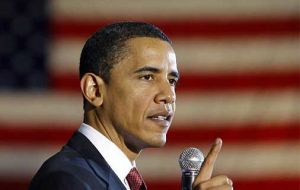MercoPress. South Atlantic News Agency
Stock markets fall sharply in response to Obama’s bank reform proposal
 Obama said he was ready for a fight with the big banks but insisted: “never again will the American taxpayer be held hostage by banks that are too big to fail”.
Obama said he was ready for a fight with the big banks but insisted: “never again will the American taxpayer be held hostage by banks that are too big to fail”. World stock markets have fallen sharply in response to far-reaching plans by US President Barack Obama to curb the activities of the biggest US banks. The Dow Jones closed down 2%, its worst fall since October, while Japan's Nikkei closed at a three-week low.
Shares in major US banks Goldman Sachs, JP Morgan and Bank of America all fell.
Mr Obama - who said he was “ready for a fight” with banks - plans to limit the size of banks and impose restrictions on risky trading. “Never again will the American taxpayer be held hostage by banks that are too big to fail” Mr Obama said.
“While the financial system is far stronger today than it was one year ago, it is still operating under the exact same rules that led to its near collapse,” he said.
His proposals may mean that some of the biggest US banks have to be broken up.
They also include a ban on retail banks using their own money in investments - known as proprietary trading. Instead, banks would be limited to investing their customers' funds. That attitude brought an immediate reaction from the markets.
Investment banking giant Goldman Sachs lost more than 4% despite announcing a sharp increase in profits. Bank of America fell 6.2% and shares in JP Morgan Chase were down 6.6%.
Mr Obama's move is his first proposal since Republican Scott Brown's shock victory in Massachusetts to win a Senate seat.
The Republican victory may make it harder to get Obama's proposals passed in the Senate, as they are more likely to get held up in political wrangling.
“This is a political effort because of what happened in Massachusetts,” said economist Peter Morici of the University of Maryland.
Banks have also been lobbying against more stringent regulation.
“If these folks want a fight, it's a fight I'm ready to have,” Mr Obama vowed.
The president dubbed his proposals on limiting bank risk the Volcker rule - after Paul Volcker, one of his economic advisors and a former chairman of the Federal Reserve central bank.
The moves follow popular anger at financial institutions that have been paying large bonuses to staff even as they accepted government bail-outs to keep them going.
Mr Obama's proposals appear to be a return to the principles underlying the Glass-Steagall Act. That law - from the 1930s in the aftermath of the Great Depression - separated commercial and investment banking and was eventually abolished in 1999 under President Bill Clinton.
Mr Clinton's financial secretary at the time, Robert Rubin, previously worked at Goldman Sachs and went on to be an adviser to Citigroup until last year.
The latest proposals follow 117 billion US dollars levy on banks to recoup money US taxpayers spent bailing out the banks. The tax will claw back some of the losses from a 700 billion USD taxpayer bail-out of US banks known as the Troubled Asset Relief Program (Tarp).
It was drawn up in the midst of the financial crisis in 2008, following the collapse of US investment bank Lehman Brothers and rescue of insurance giant American International Group (AIG).
The industry lobby group for banks suggested Mr Obama was trying to return the US to the past.
“The better answer is to modernise the regulatory framework and not take the industry and the economy back to the 1930s,” said the Financial Services Roundtable, an industry group that represents large Wall Street institutions.
In the UK, City Minister Lord Myners said the US proposals were “very much in accordance with the direction we have been setting”.
While shadow chancellor George Osborne said that if the Conservatives won the next general election, they would impose an identical dismantling of UK banks to those suggested by the US president.




Top Comments
Disclaimer & comment rules-

-

-

Read all commentsthere should be collected from Gaygons ( gay Pentagon) who invaded
Jan 22nd, 2010 - 06:50 pm 0California Republic , Atlantic Republic , Texas Republic !!!
gong you think plausible
Jan 22nd, 2010 - 07:14 pm 0what is the name of them: United States of America !
means that ..elsewhere in America Continent there are
many States who were united (confederation)..(no guarantee to
continue for this Union !)
Confederation Army has be taxed for these States (Republics) !!
Gong, the Republic of Texas was not invaded, but voted to become part of the union, and with the right to secede reserved. Only state in the USA that can fly the state flag the same heigth as the US flag..
Jan 24th, 2010 - 12:44 pm 0Commenting for this story is now closed.
If you have a Facebook account, become a fan and comment on our Facebook Page!